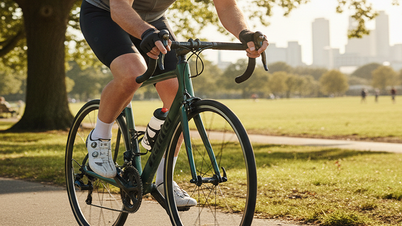Analysis by Dr. Heather Viola, primary care physician at Mount Sinai Doctors-Ansonia (New York, USA) shows why you should walk after eating, whether it's breakfast, lunch or dinner.
 |
| 5 benefits of walking after eating. (Source: Shutterstock) |
After dinner, many people may want to rest instead of doing even the lightest physical activity. However, there are many benefits of walking after eating that we should all take note of.
These benefits go beyond just boosting endorphins or reducing stress levels, as leisurely walks produce serotonin. Walking after meals has been shown to have many benefits for our overall health.
Below are 5 benefits of walking after eating, according to Dr. Heather Viola, primary care physician at Mount Sinai Doctors-Ansonia (New York, USA).
Improve digestion
According to Vogue , bloating, constipation, acid reflux, and stomach pain are signs of indigestion that you may experience after eating. One way to alleviate these symptoms is to take a brisk walk. "Walking after eating stimulates your stomach and intestines, causing food to move through your body more quickly and aid digestion," says Dr. Viola.
Reduce the risk of heart disease
Studies show that regular exercise is good for your heart health. It has been shown to lower blood pressure and cholesterol, and reduce the risk of heartburn, heart attack, stroke, and other heart problems.
One study even showed that doing small, quick workouts, such as a 10-15 minute walk after a meal, may be even more beneficial in reducing heart disease risk than a longer workout session.
Regulate blood sugar levels
According to Dr. Viola, not moving after eating can cause your blood sugar to spike. The U.S. Centers for Disease Control and Prevention explains that having too much sugar in your blood will exceed the storage capacity of your liver and muscles, and the excess sugar will be stored elsewhere. If this continues to happen, over time it will lead to insulin resistance and set the stage for prediabetes and type 2 diabetes.
Studies show that walking after eating helps reduce and balance blood sugar levels and is an effective way to reduce those risks.
Walking after a meal clears your mind and aids digestion. Scientists have found that walking for 15 minutes after a meal can lower blood sugar levels, helping to prevent complications like type 2 diabetes. But it turns out that even just a few minutes of walking can trigger these benefits.
In a meta-analysis recently published in the journal Sports Medicine , researchers looked at the results of seven studies comparing the effects of sitting versus standing or walking on measures of cardiovascular health, including insulin and blood sugar levels, according to the New York Times .
They found that gentle walking after meals, in increments of 2 to 5 minutes, had a significant impact on blood sugar control.
Promote healthy weight loss
Regular exercise is the most effective way to stay healthy, but even just taking a short walk after meals can help maintain or lose weight.
Dr. Viola explains that you need to burn more calories than you take in to lose weight (to lose 0.5kg, you need to burn about 3,500 calories) and your body expends more energy when you walk, so you burn more calories. Walking will also help regulate your appetite and curb cravings for unhealthy snacks between meals.
Experts recommend brisk walking, but even a light walk at a slow pace is better than just sitting and doing nothing.
Sleep better
Walking after dinner is especially helpful in regulating your circadian rhythm, says Dr. Viola. It enhances your body's natural sleep-wake cycle, helping you fall asleep more easily and enjoy deeper, more restorative rest.
Walking can help ease stomach discomfort after meals so it also leads to a more comfortable and, more importantly, uninterrupted sleep throughout the night.
When should you take a walk after eating?
According to Viola, there's no specific time frame for you to start your walking trip. You can even go right after eating, as some studies show that's when you get the most benefits.
But experts note that you may experience stomach upset if you do any physical activity immediately after a meal, so you should wait about 15 minutes. Overall, it really depends on how each person feels.
How long should I walk after eating?
It all depends on your goals. If you just want to aid your digestion, a 10-minute walk around the block after each meal is enough to be beneficial. But if you’re looking to improve your overall fitness goals or hit those 10,000 steps, a 30-minute walk is recommended.
While walking after meals is encouraged, Viola advises against jogging or over-exercising as it can lead to digestive problems.
(according to Dan Tri)
Source




![[Photo] Enjoy the Liuyang Fireworks Festival in Hunan, China](https://vphoto.vietnam.vn/thumb/1200x675/vietnam/resource/IMAGE/2025/10/26/1761463428882_ndo_br_02-1-my-1-jpg.webp)
![[Photo] Nhan Dan Newspaper displays and solicits comments on the Draft Documents of the 14th National Party Congress](https://vphoto.vietnam.vn/thumb/1200x675/vietnam/resource/IMAGE/2025/10/26/1761470328996_ndo_br_bao-long-171-8916-jpg.webp)

![[Photo] General Secretary To Lam received the delegation attending the international conference on Vietnam studies](https://vphoto.vietnam.vn/thumb/1200x675/vietnam/resource/IMAGE/2025/10/26/1761456527874_a1-bnd-5260-7947-jpg.webp)




























![[Photo] Prime Minister Pham Minh Chinh attends the opening of the 47th ASEAN Summit](https://vphoto.vietnam.vn/thumb/1200x675/vietnam/resource/IMAGE/2025/10/26/1761452925332_c2a-jpg.webp)







































































Comment (0)